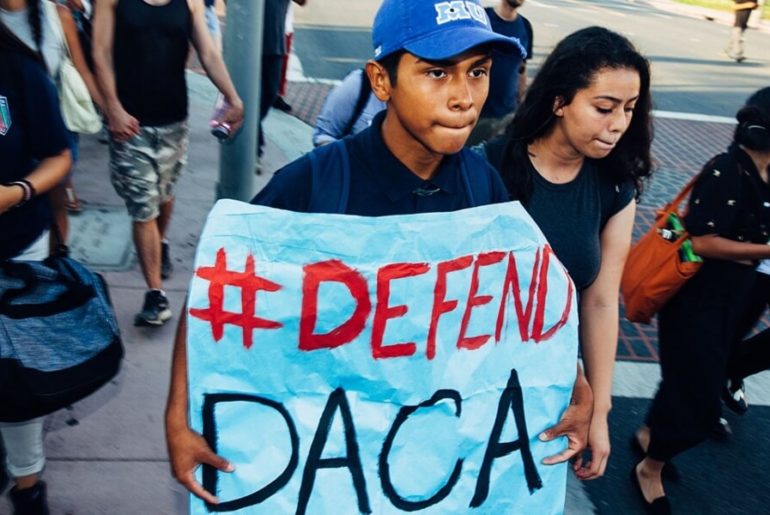On November 12th, nine justices debated on the fate of nearly 700,000 thousand immigrants and whether or not they can continue to call the U.S. their home.
The first time I held a DACA card in my hands was the first time I felt free. There was still much I couldn’t do (such as travel out of the country or vote) but having a document acknowledging my existence in this country felt like a huge step forward. Now, 7 years later, my fate is in limbo once again, resting in the hands of 9 judges who have no idea what it’s like to have your existence criminalized by your own government. Their decision could strip me of everything—my job, my home, my family—but my dignity and humanity, those will remain intact.
Gabriela Andrade, DACA recipient, told Revolution English.
The Supreme Court is set to decide whether the Trump administration can shut down the Deferred Action for Childhood Arrivals (DACA), an Obama-era policy that grants deferral from deportation and work permits to nearly 700,000 undocumented immigrants who arrived in the country before they were 16 years old.
President Donald Trump, who has recently referred to the program’s recipients as “very tough, hardened criminals,” made the decision to end DACA in 2017.
Since then, Federal courts in California, New York and Washington, D.C., all found that the initial justification the Trump administration gave for ending DACA didn’t hold up – it was just a one-page document where former Attorney General Jeff Sessions called the program illegal and unconstitutional.
All three federal appeals courts argued that when an administration revokes a policy like this, where it involves the lives of so many people as well as businesses and even the country’s economy are affected, the government must provide a fully supported justification on its decision.
However, things didn’t look good for DACA in the Nov. 12th trial.
Justices Clarence Thomas, Samuel Alito, Neil Gorsuch, and Brett Kavanaugh, all in favor of putting an end to DACA, made arguments to persuade the president of the court, Justice John Roberts, who did not seem to be so convinced.
Meanwhile, the four liberal judges of the supreme court, Clarence Thomas, Ruth Bader Ginsburg, and Sonia Sotomayor, seemed to favor DACA’s defense by arguing that the government needs to provide a rational explanation about its decision and assume responsibility for affecting hundreds of thousands of people and the companies that employ them.
“There’s a strange element to your argument,” Justice Ruth Bader Ginsburg told the solicitor general when he argued that “this is a discretionary matter” and therefore “not reviewable because it’s committed to agency discretion.”
“But on the other hand,” she said, “you say the agency had no discretion because this program was illegal… So how can it be committed to your discretion when you’re saying ‘we have no discretion’?”
Roberts echoed the sentiment that the Trump administration had not given an adequate explanation for its action on the termination of DACA, and Sessions’ one-sentence decision saying DACA was illegal, was not enough. However, the Trump administration lawyer, solicitor General Francisco, contended that even if DACA is legal, Trump has decided to shut it down.
We own this, he said.
Brought to the U.S. without papers as children, the DREAMers were allowed to legally work and go to school if they met certain requirements and passed a background check. Some of these immigrants, who are now in their 30s, speak only English and generally feel a much stronger connection to the United States since they remember little if anything about the few years they spent in their country of birth.
A decision is expected no later than June 2020. However, DACA recipients who currently have or previously had DACA can continue to submit applications to renew their DACA for the time being.

